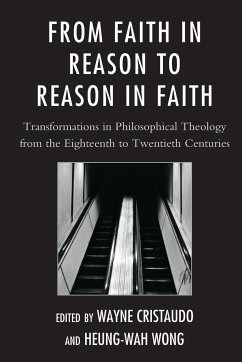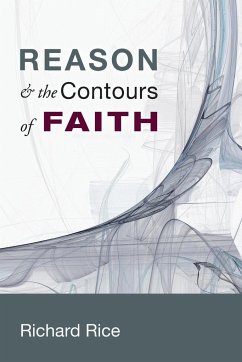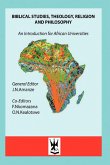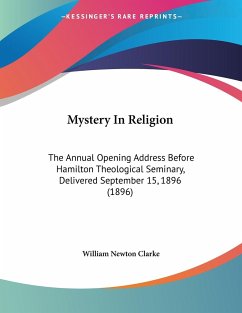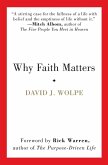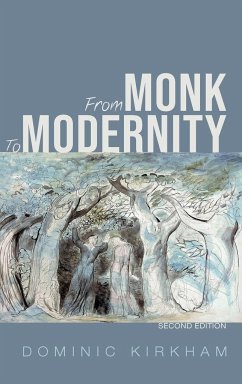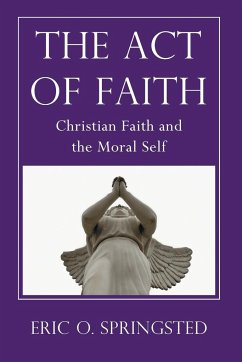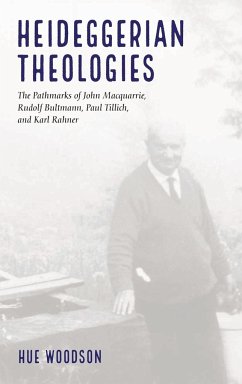From Faith in Reason to Reason in Faith
Transformations in Philosophical Theology from the Eighteenth to Twentieth Centuries
Herausgeber: Cristaudo, Wayne; Wong, Heung-Wah
From Faith in Reason to Reason in Faith
Transformations in Philosophical Theology from the Eighteenth to Twentieth Centuries
Herausgeber: Cristaudo, Wayne; Wong, Heung-Wah
- Broschiertes Buch
- Merkliste
- Auf die Merkliste
- Bewerten Bewerten
- Teilen
- Produkt teilen
- Produkterinnerung
- Produkterinnerung
Written by leading international scholars, this interesting book traces how our modern understanding of faith and reason has evolved. It provides an invaluable guide to the history of modern philosophical theology and clearly identifies why the relationship between faith and reason is of such social and philosophical importance today.
Andere Kunden interessierten sich auch für
![Reason & the Contours of Faith Reason & the Contours of Faith]() Richard RiceReason & the Contours of Faith37,99 €
Richard RiceReason & the Contours of Faith37,99 €![Biblical Studies, Theology, Religion and Philosophy. An Introduction for African Universities Biblical Studies, Theology, Religion and Philosophy. An Introduction for African Universities]() Biblical Studies, Theology, Religion and Philosophy. An Introduction for African Universities75,99 €
Biblical Studies, Theology, Religion and Philosophy. An Introduction for African Universities75,99 €![Mystery In Religion Mystery In Religion]() William Newton ClarkeMystery In Religion19,99 €
William Newton ClarkeMystery In Religion19,99 €![Why Faith Matters Why Faith Matters]() David J WolpeWhy Faith Matters17,99 €
David J WolpeWhy Faith Matters17,99 €![From Monk to Modernity, Second Edition From Monk to Modernity, Second Edition]() Dominic KirkhamFrom Monk to Modernity, Second Edition39,99 €
Dominic KirkhamFrom Monk to Modernity, Second Edition39,99 €![The Act of Faith The Act of Faith]() Eric O. SpringstedThe Act of Faith34,99 €
Eric O. SpringstedThe Act of Faith34,99 €![Heideggerian Theologies Heideggerian Theologies]() Hue WoodsonHeideggerian Theologies39,99 €
Hue WoodsonHeideggerian Theologies39,99 €-
-
-
Written by leading international scholars, this interesting book traces how our modern understanding of faith and reason has evolved. It provides an invaluable guide to the history of modern philosophical theology and clearly identifies why the relationship between faith and reason is of such social and philosophical importance today.
Hinweis: Dieser Artikel kann nur an eine deutsche Lieferadresse ausgeliefert werden.
Hinweis: Dieser Artikel kann nur an eine deutsche Lieferadresse ausgeliefert werden.
Produktdetails
- Produktdetails
- Verlag: University Press of America
- Seitenzahl: 238
- Erscheinungstermin: 9. Dezember 2011
- Englisch
- Abmessung: 229mm x 152mm x 13mm
- Gewicht: 351g
- ISBN-13: 9780761854906
- ISBN-10: 0761854908
- Artikelnr.: 34748235
- Herstellerkennzeichnung
- Libri GmbH
- Europaallee 1
- 36244 Bad Hersfeld
- gpsr@libri.de
- Verlag: University Press of America
- Seitenzahl: 238
- Erscheinungstermin: 9. Dezember 2011
- Englisch
- Abmessung: 229mm x 152mm x 13mm
- Gewicht: 351g
- ISBN-13: 9780761854906
- ISBN-10: 0761854908
- Artikelnr.: 34748235
- Herstellerkennzeichnung
- Libri GmbH
- Europaallee 1
- 36244 Bad Hersfeld
- gpsr@libri.de
Wayne Cristaudo is the director of European studies at the University of Hong Kong. He has written and edited a dozen books, including Great Ideas in the Western Literary Canon (with Peter Poiana) and Power, Love and Evil: Contribution to a Philosophy of the Damaged. He is also the author of two forthcoming books: Religion, Redemption, and Revolution and A Philosophical History of Love. Heung-wah Wong, Ph.D., is a cultural anthropologist and associate professor of Japanese studies at the University of Hong Kong. He has written numerous articles in leading scholarly journals and is the author and editor of a number of books, including the highly acclaimed Japanese Bosses, Chinese Workers. Wong is the series editor of Culture, Society, and Business in East Asia and the co-editor of St. Augustine: His Relevance and Legacy (with Wayne Cristaudo). His focuses lie in business, the pornographic culture in Asia, and creative industries in Asia.
Foreword Heung-wah Wong Introduction Wayne Cristaudo 1 Faith and
Reflexivity: Reflections on Language and the "Semiotic Turn" Christopher
Hutton 2 The Destructive Potential of the God of Reason (Reimarus)
Englehard Weigl 3 The Material God in Diderot's D'Alembert's Dream Miran
Bozovic 4 Anthropologist of Enlightenment: Purity, Pollution, and Forbidden
Mixtures in Hamann's Metacriticism Peter J. Leithart 5 Hegel on Kant,
Fichte, Jacobi: Being Reasonable about Faith and Knowledge Wayne Cristaudo
6 Beyond Paradox: Faith and Reason in the Thought of Søren Kierkegaard
Murray Rae 7 Nature, Nurture and Nietzsche's Faith in Life Nalin Ranasinghe
8 Reason and Faith: A Comparison of Immanuel Kant and Albert Schweitzer
Predrag Cicovacki 9 Faith and Reason: Shestov and Gilson Mathew Del Nevo 10
Karl Barth: Reason Beyond Autonomy? Phillip Tolliday 11 Consciousness and
Transcendence: Voegelin and Lonergan on the Reasonableness of Faith Glenn
Hughes 12 Reason and Violence in Girard's Mimetic Theory: The Anthropology
of the Cross Robert Hamerton-Kelly 13 The Spirit Has Reasons That
Rationalists Cannot Fathom: The Emergence of Christian Dao-ology in Late
Twentieth Century China Lauren Pfister Index Contributors
Reflexivity: Reflections on Language and the "Semiotic Turn" Christopher
Hutton 2 The Destructive Potential of the God of Reason (Reimarus)
Englehard Weigl 3 The Material God in Diderot's D'Alembert's Dream Miran
Bozovic 4 Anthropologist of Enlightenment: Purity, Pollution, and Forbidden
Mixtures in Hamann's Metacriticism Peter J. Leithart 5 Hegel on Kant,
Fichte, Jacobi: Being Reasonable about Faith and Knowledge Wayne Cristaudo
6 Beyond Paradox: Faith and Reason in the Thought of Søren Kierkegaard
Murray Rae 7 Nature, Nurture and Nietzsche's Faith in Life Nalin Ranasinghe
8 Reason and Faith: A Comparison of Immanuel Kant and Albert Schweitzer
Predrag Cicovacki 9 Faith and Reason: Shestov and Gilson Mathew Del Nevo 10
Karl Barth: Reason Beyond Autonomy? Phillip Tolliday 11 Consciousness and
Transcendence: Voegelin and Lonergan on the Reasonableness of Faith Glenn
Hughes 12 Reason and Violence in Girard's Mimetic Theory: The Anthropology
of the Cross Robert Hamerton-Kelly 13 The Spirit Has Reasons That
Rationalists Cannot Fathom: The Emergence of Christian Dao-ology in Late
Twentieth Century China Lauren Pfister Index Contributors
Foreword Heung-wah Wong Introduction Wayne Cristaudo 1 Faith and
Reflexivity: Reflections on Language and the "Semiotic Turn" Christopher
Hutton 2 The Destructive Potential of the God of Reason (Reimarus)
Englehard Weigl 3 The Material God in Diderot's D'Alembert's Dream Miran
Bozovic 4 Anthropologist of Enlightenment: Purity, Pollution, and Forbidden
Mixtures in Hamann's Metacriticism Peter J. Leithart 5 Hegel on Kant,
Fichte, Jacobi: Being Reasonable about Faith and Knowledge Wayne Cristaudo
6 Beyond Paradox: Faith and Reason in the Thought of Søren Kierkegaard
Murray Rae 7 Nature, Nurture and Nietzsche's Faith in Life Nalin Ranasinghe
8 Reason and Faith: A Comparison of Immanuel Kant and Albert Schweitzer
Predrag Cicovacki 9 Faith and Reason: Shestov and Gilson Mathew Del Nevo 10
Karl Barth: Reason Beyond Autonomy? Phillip Tolliday 11 Consciousness and
Transcendence: Voegelin and Lonergan on the Reasonableness of Faith Glenn
Hughes 12 Reason and Violence in Girard's Mimetic Theory: The Anthropology
of the Cross Robert Hamerton-Kelly 13 The Spirit Has Reasons That
Rationalists Cannot Fathom: The Emergence of Christian Dao-ology in Late
Twentieth Century China Lauren Pfister Index Contributors
Reflexivity: Reflections on Language and the "Semiotic Turn" Christopher
Hutton 2 The Destructive Potential of the God of Reason (Reimarus)
Englehard Weigl 3 The Material God in Diderot's D'Alembert's Dream Miran
Bozovic 4 Anthropologist of Enlightenment: Purity, Pollution, and Forbidden
Mixtures in Hamann's Metacriticism Peter J. Leithart 5 Hegel on Kant,
Fichte, Jacobi: Being Reasonable about Faith and Knowledge Wayne Cristaudo
6 Beyond Paradox: Faith and Reason in the Thought of Søren Kierkegaard
Murray Rae 7 Nature, Nurture and Nietzsche's Faith in Life Nalin Ranasinghe
8 Reason and Faith: A Comparison of Immanuel Kant and Albert Schweitzer
Predrag Cicovacki 9 Faith and Reason: Shestov and Gilson Mathew Del Nevo 10
Karl Barth: Reason Beyond Autonomy? Phillip Tolliday 11 Consciousness and
Transcendence: Voegelin and Lonergan on the Reasonableness of Faith Glenn
Hughes 12 Reason and Violence in Girard's Mimetic Theory: The Anthropology
of the Cross Robert Hamerton-Kelly 13 The Spirit Has Reasons That
Rationalists Cannot Fathom: The Emergence of Christian Dao-ology in Late
Twentieth Century China Lauren Pfister Index Contributors

